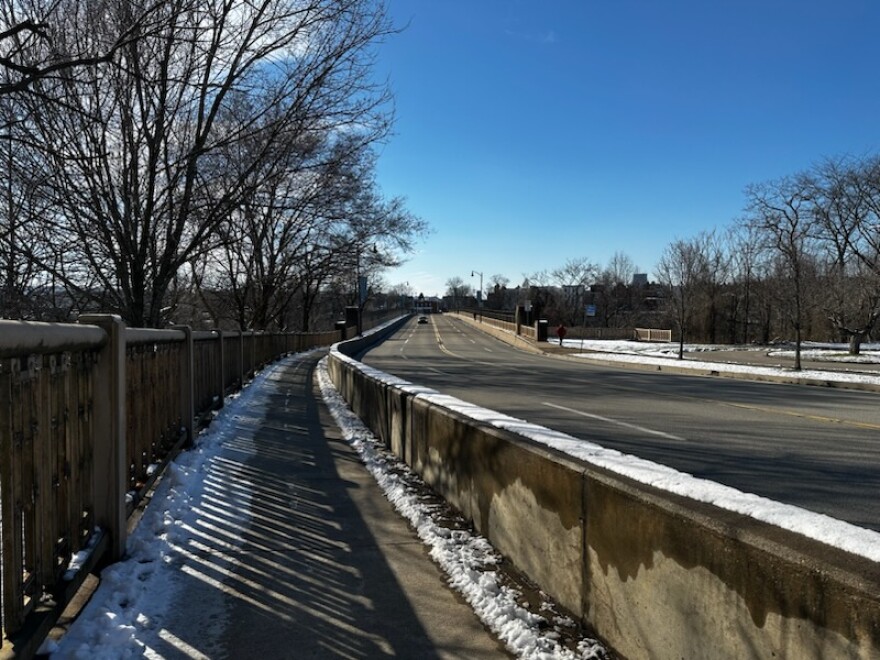A massive $36.1 million effort to manage the flow and collection of stormwater in the city’s Four Mile Run area is expected to begin in late spring, Pittsburgh Water and Sewer Authority officials told residents at a public meeting Tuesday night.
Flooding has plagued the lower part of Greenfield, called the Run, for years; it sits at the bottom of the M-29 sewershed, a densely populated 2,400-acre stretch of the city that includes the neighborhoods of Garfield, Squirrel Hill, Oakland and Hazelwood. When it rains, stormwater funnels through Schenley Park and Panther Hollow Lake and into the Run, where two major sewer lines meet. If the system can’t handle the influx, untreated sewage overflows into people’s homes.
The first part of the project will be to restore a 50-inch pipe that collects all of the water flowing to the Monongahela River, said Mallory Griffin, a project manager for PWSA. They will install a metal flap gate that will stop the river from backing up into the network, which should prevent overflows upstream.
“The results of this project will show you an immediate impact on flood reduction,” she said.
PWSA will then replace large water and sewer lines, as well as add new storm sewer lines to the Run before moving into Schenley Park, where the Four Mile Run stream will be directed into a channel. Panther Hollow Lake will be dredged and updated to act as a collection point for stormwater. The entire project is expected to run through late 2023.
While many people welcomed the work and said it was desperately needed, others such as attendee Ray Gerard said it fell short of a true solution.
“It doesn’t do enough given the severity and the frequency of flooding,” he said, referencing PWSA’s presentation that showed projected reductions in 10-year floods. “[Flooding is] going to increase with climate change and out of control development.”
The project’s manager Tony Igwe said there will be reductions at other levels, too, but that no city in the country has built infrastructure to withstand 75-year flood levels. He added that PWSA is constrained by what the agency’s ratepayers can afford.
“Whatever we provide for Four Mile Run we have to provide for the rest of the system,” he said, adding that part of their approach in planning is to create infrastructure that can adjust to future realities. “But we have to pick something that people can actually afford.”
The project has been a long time coming, but attendees expressed a mix of approval and skepticism; the initiative can’t seem to escape its association with a divisive transportation project called the Mon Oakland Connector, a transit corridor the city wants to build in the same area. The stormwater and transit projects have long been presented as inseparable, and many people worried the quality of the stormwater project has been constrained because of that.
Attendee Irene Surmik asked if PWSA was told not to interfere with the transit project.
"I mean, is that the project that has priority here?”
Others asked why permits for the two projects were presented simultaneously, and whether that could harm the stormwater work. After numerous questions along the same line, Griffin stressed that PWSA’s project is not affected by the transit project.
“They’re not helping us, we’re not helping them,” she said. “They actually don’t need us to get their project done.”
The federal Environmental Protection Agency and the state Department of Environmental Protection have been after Pittsburgh for years to reduce combined sewer overflows. PWSA, the city, the Pittsburgh Parks Conservancy and ALCOSAN have all been working to prevent stormwater from flowing into the sanitary system as well as to upgrade the existing system. But that infrastructure is old and sprawling and will require a significant amount of investment to make a dent.
If all of PWSA’s permits are approved, crews will begin work on the Four Mile Run project in May.
Start your morning with today’s news on Pittsburgh and Pennsylvania. Sign up for WESA’s Inbox Edition newsletter.




